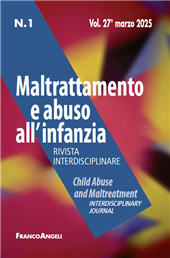Le famiglie adottive di fronte alla sindrome feto alcolica : un'analisi dei bisogni
85-100 p.
La FASD (Fetal Alchol Spectrum Disorders) è associata al consumo di alcolici in gravi-danza, è responsabile di una complessa sintomatologia ancora scarsamente conosciuta, sia in ambito di ricerca sia di intervento, ed è piuttosto diffusa nei bambini adottati. Il presente contributo intende sondare i bisogni delle famiglie adottive i cui figli hanno avuto una diagnosi di FASD. È stato condotto uno studio, nato dalla collaborazione tra il Centro d'Ateneo Studi e Ricerche sulla Famiglia e l'Associazione Italiana Disordini da Esposizione Fetale ad Alcool e/o Droghe (AIDEFAD), che si è posto l'obiettivo di esplorare il punto di vista di famiglie adottive con figli con FASD di differenti età, attraverso interviste con i genitori (6 coppie di genitori e una madre single) e Focus Group con i figli (4 giovani adulti d'età compresa tra i 24 ed i 30 anni). I dati sono stati analizzati attraverso un'analisi testuale con metodo carta e matita e sono state identificate delle macrocategorie di bisogni. Tra i vari bisogni
emersi, nelle narrative sia dei genitori sia dei figli, sono apparsi particolarmente centrali quelli legati al riconoscimento e alla gestione delle difficoltà connesse alla sindrome, alla storia adottiva e alle informazioni sull'origine, al sostegno sociale/relazionale (di coppia, familiare, amicale e professionale) e bisogni connessi alla progettazione del futuro. I bisogni espressi dalle famiglie adottive e dai giovani adulti, portatori della sindrome, hanno fornito importanti indicazioni per la pratica di intervento con le famiglie che verranno discusse. [Testo dell'editore]
FASD (Fetal Alcohol Spectrum Disorders) is associated with the consumption of alcohol during pregnancy, it's responsible for a complex symptomatology that is still poorly understood both in the research and intervention fields, and rather widespread in institutionalized children. This contribution aims to probe the needs of adoptive families, whose children have been diagnosed with FASD. This study was born out from the collaboration between the University Center for Family Studies and Research and the Italian Association of Fetal Exposure Disorders to Alcohol and/or Drugs (AIDEFAD). This study aimed to explore the point of view of adoptive families, with children with FASD of different ages, through interviews with parents (6 pairs of parents and a single mother) and Focus Group with the children (4 young adults between the ages of 24 and 30). The collected data was analyzed through a textual analysis using the pencil and paper method. Macro categories of needs have been identified. Among the various needs
that emerged, in the narratives of both parents and children, the most crucial were those related to the recognition and managing of the difficulties linked to the syndrome; to the adoptive history and information about the origins; to social/relational support (from the couple, family, friends, and professionals); and needs related to future plans. The needs expressed by adoptive families and young adults with the syndrome provided important indications for the practice of intervention with the families that will be discussed. [Publisher's text]
-
store_in_same_fr
-
information
doiCode: 10.3280/MAL2025-001005
issn: 1972-5140
KEYWORDS
- famiglie adottive, sindrome feto alcolica, disabilità, bisogni
- adoptive families, Fetal Alcohol Syndrome, disability, needs


